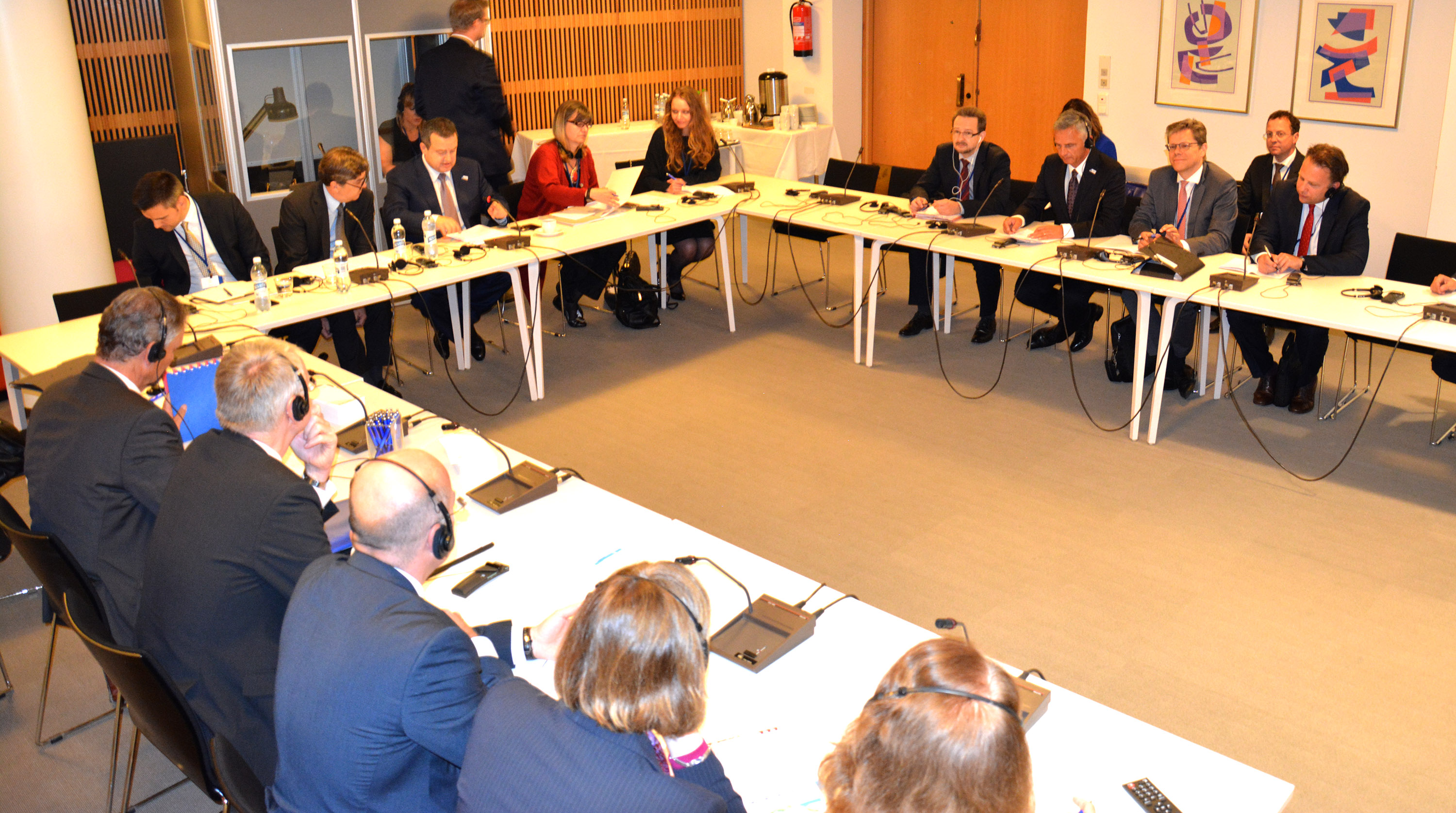



| Friday, 10 July 2015. | |
| Opening Remarks by OSCE Chairman-in-Office at the Informal High Level Meeting in Helsinki | |
| + larger fontnormal font- Smaller font |
 Opening Remarks by OSCE Chairman-in-Office, First Deputy Prime Minister and Minister of Foreign Affairs of the Republic of Serbia Ivica Dacic at the Informal High Level Meeting in Helsinki: Opening Remarks by OSCE Chairman-in-Office, First Deputy Prime Minister and Minister of Foreign Affairs of the Republic of Serbia Ivica Dacic at the Informal High Level Meeting in Helsinki:Minister Soini, Minister Burkhalter, Excellencies, Ladies and Gentlemen, I am pleased to welcome you to the second part of our meeting, for what I hope will be an interactive and genuine exchange on how to move our security dialogue forward in these exceedingly challenging times. I would like to thank our Finnish hosts for their generous hospitality and excellent organisation. We have just marked the 40th anniversary of the Helsinki Final Act with a simple but highly symbolic ceremony. We all share a deep-felt unease and anxiety about the current state of European security. Yet we cannot assume that somehow we will miraculously return to more settled and relaxed conditions that could give us greater confidence to master the many challenges we face in an insecure world. Such positive transformation will simply not happen on its own. But at least we know what it takes to move forward. Not least from forty years’ experience, we know that confidence and trust can only be built through open, inclusive and frank dialogue. It requires sustained efforts, patience and perseverance. In this deep crisis of European security, we should capitalize on the fact that the OSCE is best-placed to serve as the central forum for engagement. I am convinced that our inclusive platform for dialogue and joint action provides us with a genuine opportunity to work together toward resolution of the current crisis, regaining lost confidence and reconsolidating European security. Our overriding challenge is to arrive at a political resolution of the crisis in and around Ukraine. Progress at the negotiating table and on the ground is the prerequisite not only for restoring peace and security in the OSCE region, but for returning to the path of cooperation that can bring us closer to the vision of a security community formulated in Astana. In this, as always, we must be guided by the Helsinki principles. As I have already stated, there can be no real security or stability in our region without full respect for, and strict implementation of, OSCE principles and commitments. Restoring adherence to the Helsinki principles must be a central part of this endeavour. Our meeting today is one of several efforts already initiated at various levels to engage in substantive discussion on the current state of European security. The aim is to focus on the most pressing issues on the OSCE agenda, including the broader implications of the current crisis on Euro-Atlantic and Eurasian security. While it is important that we articulate our differences in a frank and open manner, it is essential that we explore opportunities to find common ground on how to re-launch a process toward rebuilding consensus around security cooperation in Europe. It is clear that we have different threat perceptions and different readings of the developments which contributed to the rapid deterioration of trust among ourselves. In order to overcome these differences we need to get a better understanding of the roots of these divergent perspectives. If we are truly committed to the declared ambition of achieving progress on a joint, more secure future, we must go beyond just outlining our own positions. We should try to understand the other’s viewpoints and the motivations that lie behind them. Today’s discussion offers us a good opportunity to seek a better understanding of where we stand and what might be possible avenues to move forward. In order to stimulate an interactive and informal debate, I would ask our Secretary General Zannier to moderate this important debate throughout the day, and he will briefly tell us at the beginning how he will steer our work. As you know, the Chairmanship will prepare a summary of today’s discussions which can serve as basis for further deliberations, also in the run-up to the December Ministerial Council in Belgrade. One question of particular interest for us in the Chairmanship will of course be what next steps should follow from this meeting. I look forward to productive, forward-looking discussions that can help to restore the OSCE’s traditional culture of cooperation and joint action in tackling common security challenges. |